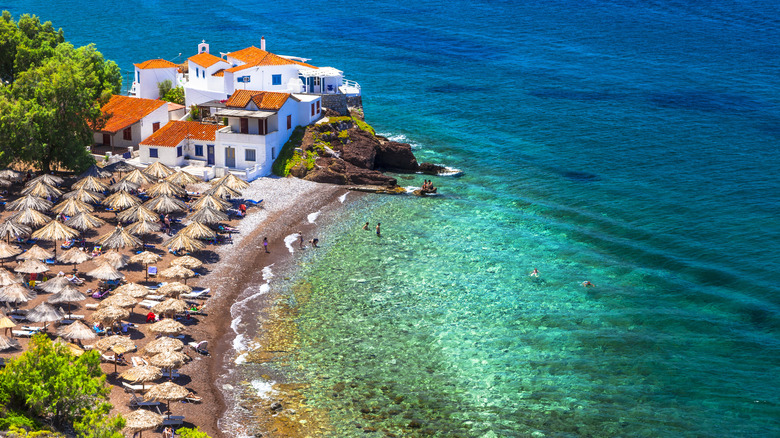With so many amazing beaches on the European continent, it may be hard to choose the best one for you. That’s where expert advice comes in handy. When the person giving advice is the world-renowned travel writer and TV host Rick Steves, we’re all ears. It’s always interesting what preferences a travel pro like Steves has. Recently, he published a list of his favorite beach destinations. While it had some classic entries like Amalfi Coast and French Riviera, there are also some lesser-known surprises.
Let’s take a closer look at the places favored by the famous travel show host and see what type of beach holiday they represent. We invite you on an enticing tour of European shores from Sicily up to Scandinavia through Ireland. Inspired by Rick Steves’ advice and mixing it with our own experience of visiting each site, we’re painting a picture of the most rewarding beach getaways in Europe here. It may inspire you book a ticket straight away.
Varenna, Italy
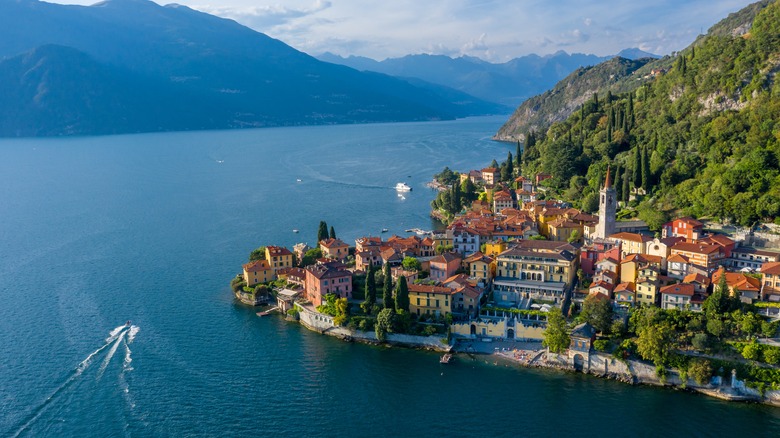
Rick Steves gets poetic when describing Varenna. Set on the shores of one of the most beautiful lakes in the world and luring you with medieval houses that line up close to the azure waters, it’s a place of inspiration and love. Steves writes that the town “whispers luna di miele (or honeymoon in Italian).” The jagged peaks create a breathtaking backdrop, and the lake mirrors the mountains in the morning and powers up the photogenic landscape during the sunset. Varenna is for artistic souls, indeed.
Sightseeing-wise, there are many unique things to do here. Varenna is where you find the sublime 19th-century Villa Monastero, the epitome of Lake Como’s aristocratic opulence, with a botanical garden, splendid interiors, and superb water views everywhere you look. The romantic ruins of 12th-century Castello di Vezio above the town are another striking vantage point. And you can’t miss a chance to stroll along the poignantly named la passeggiata degli innamorati (Italian for “walk of lovers”), which is filled with attractive cafes and restaurants with lake views.
Bellagio, Italy
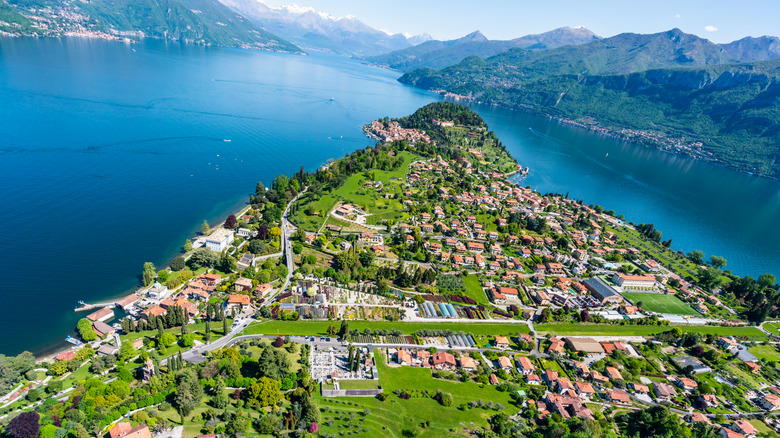
While Varenna might be Rick Steves’ favorite spot on Lake Como, he often mentions another well-known lakeside town for comparison. “[A] part of me enjoys the “tramp in a palace” feeling I get in Bellagio,” he said in an article on his website about Italy’s Lakes District, adding that this town may be the most famous Como getaway. And yes, the Ocean’s Eleven-featured casino in Las Vegas is named after this quaint waterside gem. Historic villas dot the hills with manicured gardens, the ferries and high-end boats arrive and depart from the harbor terminal, and the exclusive restaurants greet you with lake-facing terraces. Bellagio is synonymous with dolce vita, but the good life here comes with a high price tag.
“Bellagio pleases well-heeled travelers,” writes Steves, nodding at the town’s penchant for luxury and opulence. Still, it’s an uber-charming place where your morning espresso or midday Aperol Spritz will be accentuated by magnificent panoramas of mountains meeting the pristine Lake Como waters. Be sure to visit the 50-acre park at Villa Serbelloni on the hill above Bellagio for a refreshing panoramic walk.
Salema, Portugal
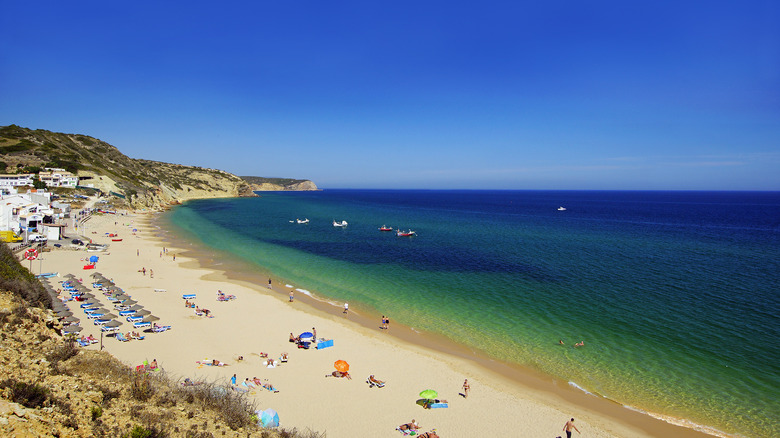
PJ photography/Shutterstock
A lesser-known beach hit with a strong fisherman heart, the TV host refers to Salema as “the last of the fairy-tale Algarve.” It’s among Rick Steves’ favorite beaches in all of Europe, after all. The sandy stretch here is wide and glorious, the restaurants haven’t lost their authenticity and serve the freshest seafood, and the glamor of resort towns further up the coast gives way to the charming simplicity of a family holiday. It’s easy to see why a champion of underdog destinations such as Steves would love Salema; it embodies comfort and accessibility.
This fishing village-cum-beach-resort is ideal for a quiet, meditative break soundtracked by the soothing waves of the Atlantic Ocean. Soak in the sun, take countless dips, enjoy long walks leaving footprints on the sand, and eat, eat well. Feast on cataplana de marisco (a traditional local seafood stew cooked in a flying saucer-shaped pot), have as much conquilhas à Algarvia (aromatic clams soaked in garlic and parsley) as you can, and accompany it with an obligatory glass or two of vinho verde (Portuguese green wine), Rick’s drink of preference.
Vernazza, Italy
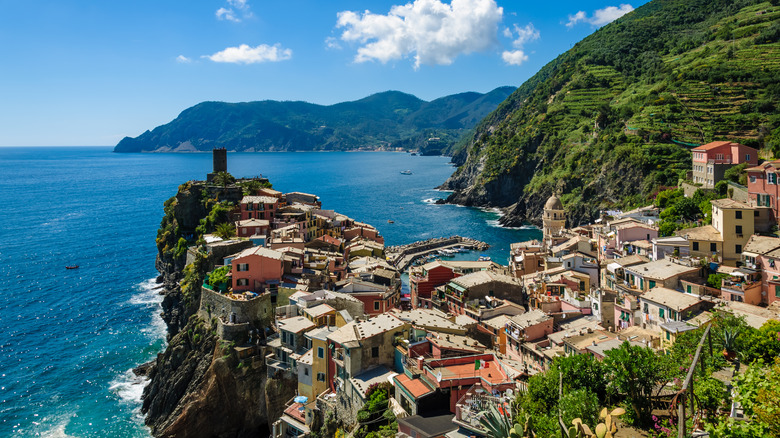
Fani Kurti/Getty Images
No cars are allowed in UNESCO-protected Cinque Terre National Park, a set of five dramatically-placed villages overlooking the blue perfection of the Ligurian Sea. And while this fragile area is at the brink of its tourist-receiving capacities, it’s still one of the most beautiful spots in Europe. Each visitor has their favorite village of the five; for Rick Steves, it’s Vernazza. No matter which viewpoint you choose, it’s eye candy. The medieval tower on the steep rocky cliff watches over the small harbor-turned-beach, the windwashed colorful facades of the fishermen’s houses create a marine idyll, and the narrow streets end with perched cascaded vineyards. Everywhere you look in Vernazza, it’s a postcard material.
There are two ways to reach the town. You can either take a train from nearby Levanto or La Spezia or opt for a more scenic hiking trail that runs through all the Cinque Terre villages. During the summer, crowds quickly fill Vernazza’s narrow streets. Winter and early spring are among the best times to visit. As for activities, Steves recommends simple pleasures like enjoying a cup of gelato while people-watching, taking an evening boardwalk stroll, and savoring local wine on a picturesque terrace.
Sorrento, Italy
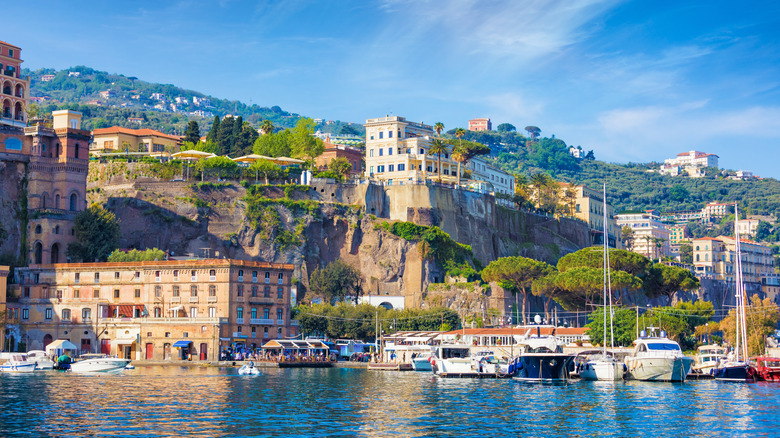
IgorZh/Shutterstock
The spirit of the Old World is strong with Sorrento. Hugged by the waters of the Bay of Naples, it’s an elegant resort town with plenty of historic hotels, colored umbrellas lined on fashionable beaches, and pastel-colored Baroque churches on airy piazzas. Take a walk through its picturesque Old Town with cobbled streets, enjoy the rustic charm of Marina Grande harbor, and take a dip at Bagni Salvatore Beach Club next to the Roman ruins.
Stay among the idyllic coastal beauty of Sorrento while exploring the hit nearby destinations like Naples (less than one and a half hours by train), Pompeii, and the islands of Capri (a 25-minute ferry ride away). Rick Steves calls the town “an ideal home base for the region” for its superb location. And don’t forget to try the limoncello; it is believed that the zesty, lemon-scented drink, the second-most popular in Italy after Campari, originated in Sorrento, and it also makes for an ideal Italian souvenir.
Positano, Italy
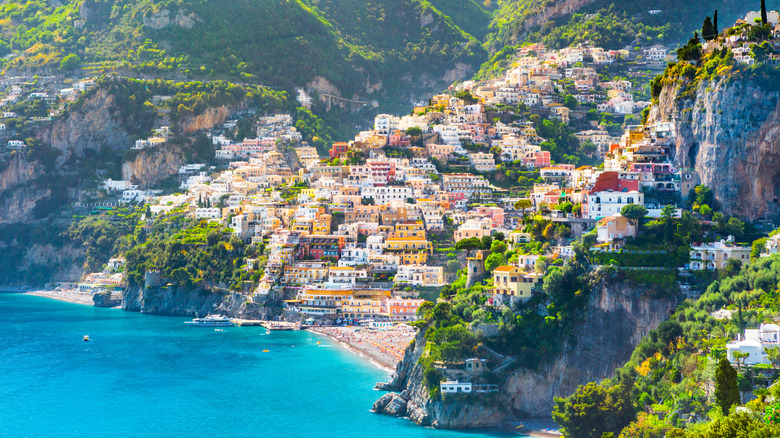
Aleh Varanishcha/Getty Images
Rick Steves is a big fan of the Amalfi Coast, and Positano is the town he consistently names as the area’s most spectacular destination. The author also writes that the bus ride from Sorrento along the twisted, perched roads of the Amalfi Coast is among the world’s most striking. Be prepared to have a stiff neck afterward, as your head will turn left and right as you enter this marvelous land of vertical-colored towns, infinite Meditteranean blue, high cliffs, luxury hotels, and some of the most scenic restaurant terraces on the planet. Positano is where the Amalfi’s beauty reaches a crescendo, and your camera space will be gone by the end of the visit, for every corner of this place is uber-photogenic.
Steves hails Positano as “a seductive gathering of name-brand boutiques and sand-splashed cafés.” It is a place to splurge, so be ready to pay more for drinks, food, and activities while navigating tourist trap eateries and fake souvenirs on every corner. Nevertheless, it’s a spectacular destination that is an absolute must for the scenery alone. If you’re on the budget, check out the towns of Maiori and Minori, less than 5 miles away.
Spetses, Greece
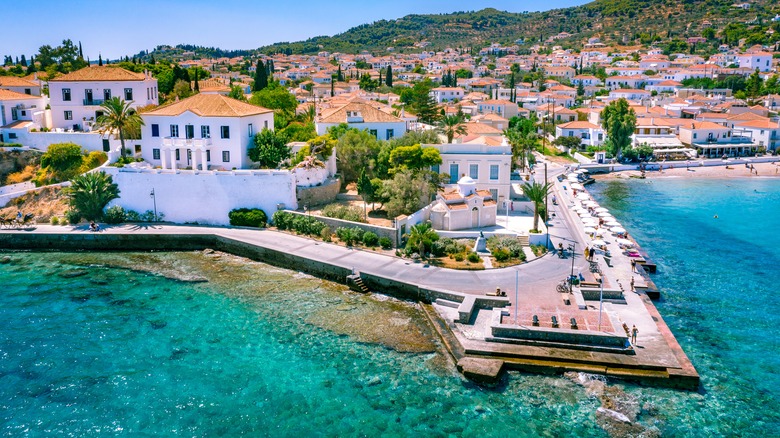
Georgios Tsichlis/Shutterstock
“There’s nothing like free time on a sleeping Greek Isle,” writes Steves, and it’s hard to disagree. If you’re looking for an easygoing, blissful island just two hours on a ferry from chaotic Athens, Spetses qualifies. Located in the Saronic Gulf, it enchants you with sacred simplicity and breathtaking Mediterranean vistas everywhere you look. Nonexistent crowds, affordable prices, and plenty of gorgeous coved beaches make it a top destination for a weekend break.
Only 10 square miles in size, Spetses is also an eco-friendly delight. Cars are banned on the island, so you can explore on a bicycle, ride a motorbike, or simply walk. The eponymous town has historic mansions, gardened villas, and an obligatory boardwalk where locals and tourists observe the sea blue while drinking frappe. Spetses also has a cinematic history; Ryan Johnson’s Netflix whodunnit movie “Glass Onion: A Knives Out Mystery” was filmed on the island.
Hydra, Greece
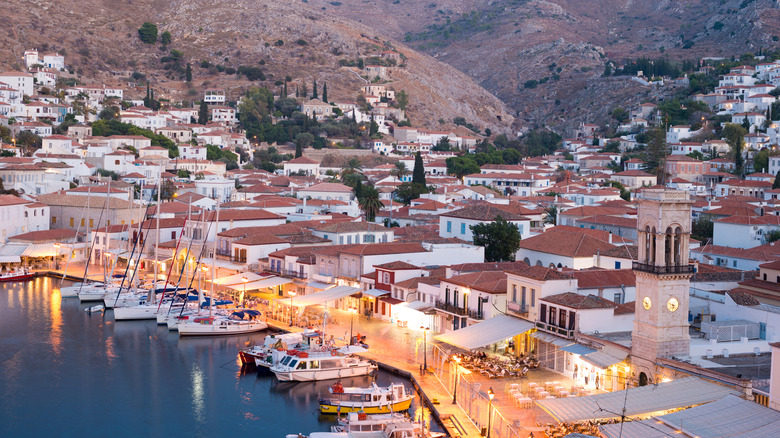
Ascentxmedia/Getty Images
The Greek Saronic island number two on Rick Steves’ European beach hideaways list, Hydra immediately charms you and doesn’t let go of your imagination easily. Henry Miller, Sophia Loren, The Rolling Stones, and Leonard Cohen were among the lovers of its shores. The dream of an island idyll is strong with Hydra. It’s calm and soothing, and the waves form its caressing music. One of the reasons for the island’s magnetic appeal is a total ban on vehicles (including motorcycles). Donkeys roam the narrow cobblestone streets, the amphitheater-like historic harbor evokes the adventurous and the romantic, and the seaside boardwalk is perfect for long contemplative strolls.
Steves also describes the island’s mouthwatering culinary side. The irresistible trio of “fresh seafood, Greek salad, and retsina wine” awaits you on Hydra. Explore the local tavernas, go to the countryside to get lost among the olive groves, discover the hidden rocky beaches of the southern coast, and give in to the laid-back atmosphere where nobody rushes anywhere.
Antibes, France
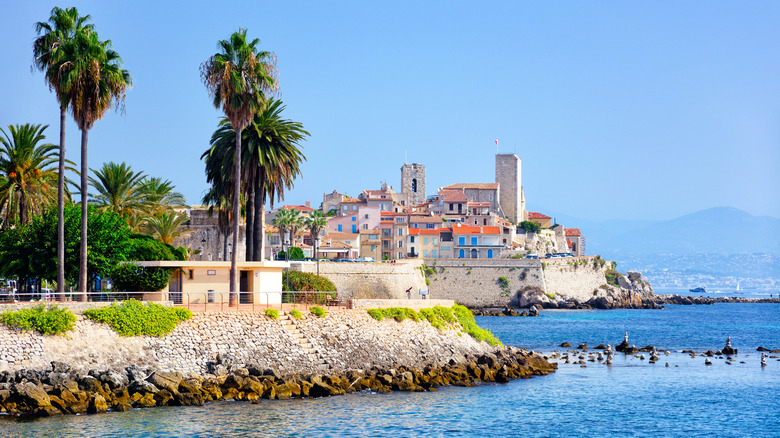
Alxpin/Getty Images
Antibes is an instant charmer. Fortified and epic, the Vieille-Ville (Old Town) here is among the most dramatic ones on the French Riviera. For Rick Steves, Antibes offers a “laid-back Riviera ideal for anyone working on a slower pulse.” While definitely not an undiscovered destination, this part of the coast receives fewer visitors than nearby Nice and Cannes, giving it a certain underdog charm with its fantastic combo of beachside leisure and interesting sightseeing.
Pairing Parisian elegance with the relaxed attitudes of the South of France, the old quarter of Antibes is a delight to explore. Usually, a visit would include having an aromatic bouillabaisse fish soup, munching on yummy pissaladière (the Côte d’Azur answer to pizza coming with onions and anchovies), and, of course, taking slow sips of cappuccino on one of the pastel-colored squares. Don’t miss the Marché provençal, the bustling morning market with fresh regional produce.
Collioure, France
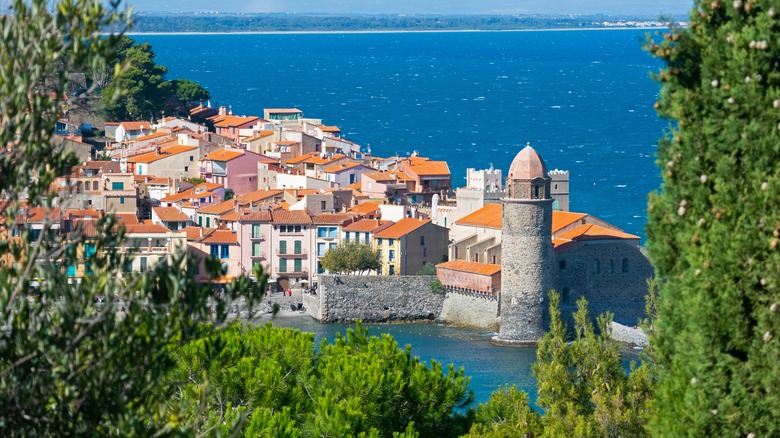
Iryna Nazarova/Shutterstock
Had Collioure been set in Côte d’Azur, it would be bathing in tourist attention. But this uber-picturesque historic resort town is located in Côte Vermeille, a lesser-known region next to the Spanish border. Rick Steves names it a “small-town-without-the-glitz antidote to condo-city Riviera” and recommends fully embracing all of its Mediterranean allure. That includes catching sun rays at the town’s idyllic beaches, having ice cream, observing the boats in the harbor, and tasting the local red wines. The vistas here are nothing short of dramatic. You’ve got a mighty harbor fortress on the one hand and the peaks of the Pyrenees on the other.
Such scenery couldn’t go unnoticed by those who create for a living. In the 20th century, Collioure emerged as a central place for Fauvism, with famous artists like Henri Matisse, André Derain, and Georges Braque coming to live and paint. Also, the town is a stronghold of Catalan culture in France; the street signs here are written in Catalan and French, and many locals use Catalan to communicate.
Dingle Peninsula, Ireland
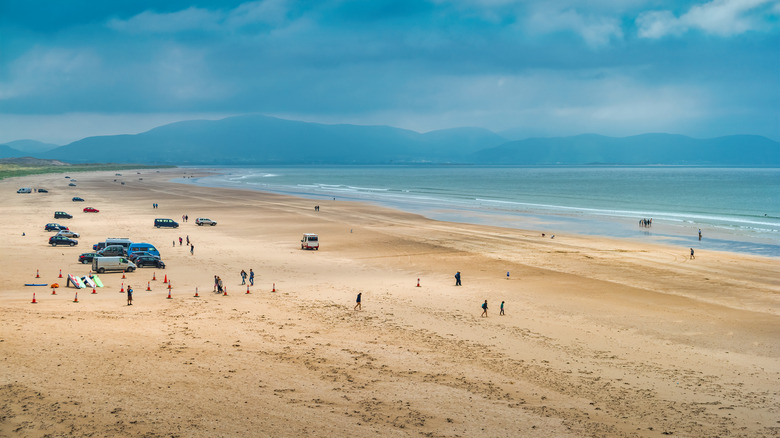
Benedek/Getty Images
The Dingle Peninsula is glorious, green, and untamed. It’s on the local coastal roads, mountain passes, and long sandy beaches that the old legends come alive. Rick Steves places this majestic “peninsula where cloverleafs come in emerald, not concrete” among his favorite European beach hideaways for the sheerness of its nature and the friendliness of its locals. The author advises visitors to rent a bike and make a 20-mile cycling journey along the coast for the most scenic experience. And there’s a lot to see here, too.
Everything starts at Dingle Town, which is “textbook Irish,” as Steves puts it. Expect colored houses along the windy bay, cozy fireside-heated pubs, and the vibrant High Street. The town is an excellent base for going to the 3.1-mile Inch Beach that was famously featured in the 1970 film “Ryan’s Daughter.” Movie buffs will also love Dunmore Head and Slea Head, where “Star Wars: The Last Jedi” was shot. For romantic gothic ruins, head to the 15th-century Rahinnane Castle, and there’s also the spectacular mountain scenery of Conor Pass, which is among Ireland’s highest.
Ærø, Denmark
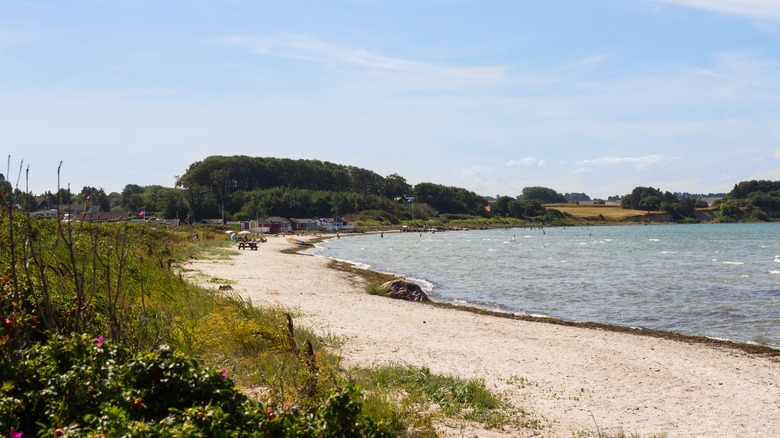
Jacob Marcussen/Shutterstock
Ærø (pronounced air-rue) is not the first island that pops into mind when you think of a European beach vacation. However, Rick Steves is an expert in discovering and suggesting beautiful under-the-radar destinations, and this corner of Denmark is a pleasant surprise on his list. What you’re getting here is the slow travel at its peak. The slow-burning, contemplative Baltic Sea vacation takes the central stage, with bicycles the prime mode of transportation. There are no jagged cliffs, dramatic villages, turquoise beaches, or awe-inspiring sights, but that’s exactly why you should visit. Ærø is all about the sustainable, calm escape for everyone.
With the trademark Danish flair, that is. You will drink coffee with cookies in the hygge-preaching cafes, explore the historic 18th-century cobbled streets of miniature towns filled with gingerbread-like houses, and ride through the endless meadows with the greyish Baltic horizon ahead. Ærø invites you on a pastoral holiday; how can you resist such an invitation?
Cefalù, Italy
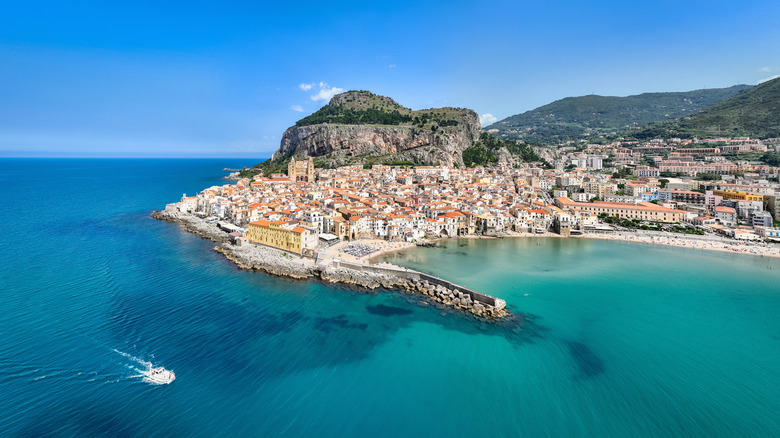
Mlenny/Getty Images
Yes, Italy has a long list of stunning seaside towns, but few of them can rival Cefalù in looks. Located on Sicily’s northern coast, it is a sight to behold, and the gigantic rock that hangs over the quintessential old town looks like Cape Town’s Table Mountain on a miniature scale. The Norman-era cathedral towering over the narrow streets finishes this dreamlike panorama. To add to the allure, you’ve got a perfect sandy beach to swim with a view. Rick Steves describes Cefalù as “the perfect combination of sand, sun, and culture,” and we can’t agree more.
We’re in Sicily, so the food is revelatory, and this town has plenty of well-priced restaurants where you can duly taste the local dishes. Pasta alla Norma (featuring fried eggplant and tomato sauce) is the queen of the Sicilian table, so make sure to have a bite. Arancini (deep-fried rice balls with various fillings) are the local street food staples, and don’t miss out on a gelato (or three) on a sea-facing boardwalk; this island produces some of the best ice cream in the world.
Rovinj, Croatia
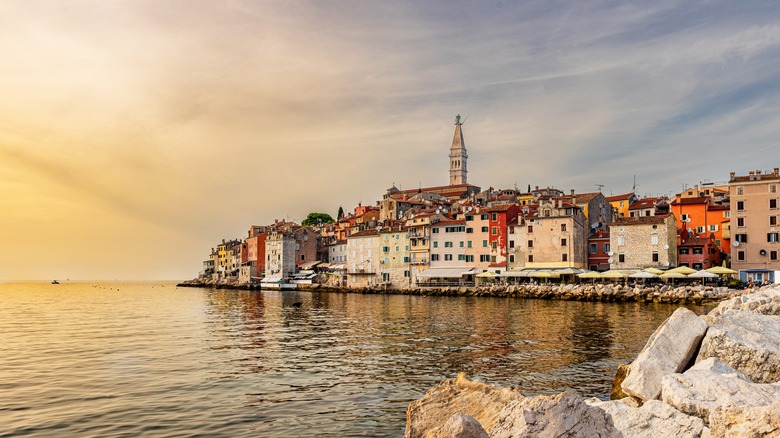
Majonit/Shutterstock
Croatia has a kaleidoscope of magnificent red rooftop towns along its 1,104-mile-long coast. Rick Steves chooses Rovinj as his favorite Adriatic beach hideaway. In a website post titled “Idyllic Istria,” Steves calls this Istrian gem “a little hunk of Venice draped over a hill” and describes its silhouette as if the town was “being pulled up to heaven by its grand bell tower.” Venetian architecture (including the winged lion, the symbol of Venice, on the main city gate) is everywhere in the historic center of Rovinj. Head to the observation platform atop the 18th-century St. Euphemia’s Basilica for the best panorama of the city and the sea.
Rovinj is an ultimate destination for lovers and romantics. The photogenic streets here call to be digitally captured or, better yet, painted. The tables of the seafood restaurants occupy the seaside boardwalk and the narrow cobbled passages. They serve trademark Croatian specialties like fried and grilled squids, tuna steaks, and cooked mussels bathed in the local white wine. Rovinj is a go-to spot for epicureans; make no mistake about that.

